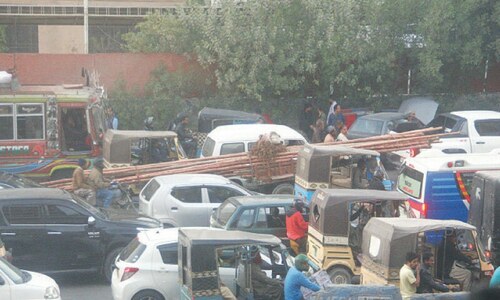KARACHI, Aug 3: Before starting collection of the less-publicised public utility charges, the city district government of Karachi (CDGK) is all set to prepare an updated database of all residential, commercial and industrial units in order to bring maximum number of people in its tax net.
On June 2, the city council had passed a resolution, through a majority vote, authorising the city government to impose public utility charges on all residential, commercial and industrial entities.
According to an approved plan, the city government will levy Rs100 to Rs1,000 per month on all residential units according to their size. The commercial units (200 square yards to 10,000 square yards) will be charged between Rs500 and Rs5,000 on a monthly basis. Whereas, industrial units covering an area of 1,000 square yards to 5,000 square yards or above will have to pay Rs500 to Rs2,000 per month under the public utility charges.
Well-placed sources told Dawn that the city government was in the process of awarding a consultancy contract for the preparation of a comprehensive database on the basis of which it would send monthly bills containing public utility charges to the residents, traders and industrialists.They said that the city government could use a database which was in use for the collection of property tax but that was too old and direly needed an update. “Once we prepare the database we would decide whether to hire a private company for the collection of public utility charges or not,” said a senior official.The sources said the collection of public utility charges would begin in a phased manner by the end of the current year. They said the city government was also mulling over a plan to impose a condition making clearance of public utility charges mandatory for the sale and purchase of residential, commercial and industrial units.
It is being widely assumed that the city government is introducing such charges to facilitate the operation of a Chinese firm that had been awarded a garbage collection contract for the next 20 years since the city government, under the agreement, was bound to pay 20 dollars to the firm for lifting and disposal of each ton of solid waste.
However, Executive District Officer (Municipal Services) Masood Alam differed with the public view and explained that the utility charges were being levied on people for using city’s infrastructure, which also included lifting and disposal of solid waste. He maintained that the charges would be levied only in the areas falling in the city government’s jurisdiction.
Mr Alam was of the view that other land controlling authorities would have to make agreement with the Chinese company for disposal of solid waste being generated in their areas because the landfill sites would be controlled by the said firm.
“None of the land controlling authorities has its landfill site and if they want proper disposal of their garbage they will have to talk to the Chinese firm. We can only make efforts to bring them onboard but the modalities would be decided between the authorities and the Chinese firm,” he added.















































Dear visitor, the comments section is undergoing an overhaul and will return soon.